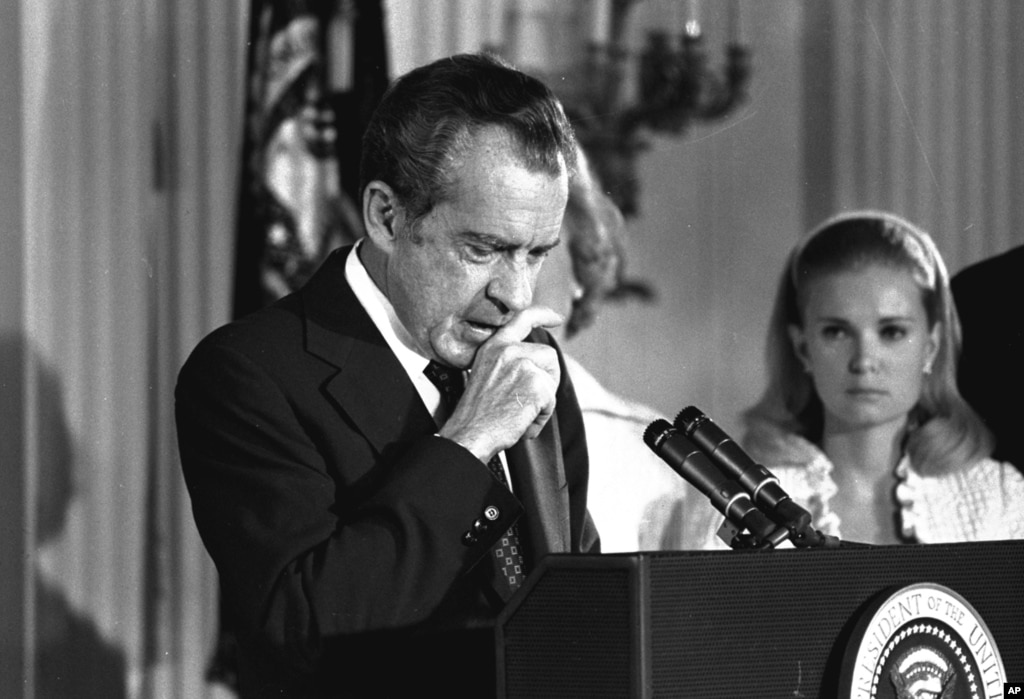
This Saturday marks the 40th anniversary of the resignation of President Richard Nixon. He resigned because of his involvement in a series of events that became known as the Watergate scandal. It began when Republican Party operatives broke into the Democratic Party offices at the Watergate building in Washington in 1972. The break-in and the Nixon administration’s attempts to hide the incident had a major effect on the United States.
Many Americans remember what they were doing on the night of August 8th, 1974. That was when President Richard Nixon announced he would resign the following day.
“I have never been a quitter. To leave office before my term is completed is abhorrent to every instinct in my body. But as president, I must put the interests of America first.”
On the day of his resignation, President Nixon spoke to White House employees.
“Always remember, others may hate you. But those who hate you don’t win unless you hate them. And then you destroy yourself.”
A short time later, the new president, Gerald Ford, sought to bring calm. He spoke to a nation that had just witnessed the first presidential resignation in its history.
“My fellow Americans, our long national nightmare is over. Our Constitution works. Our great republic is a government of laws and not of men. Here, the people rule.”
Several Nixon aides went to jail for crimes and abuse of power during the Watergate scandal. White House recordings linked Richard Nixon to the cover-up. They show he ordered aides to tell the Central Intelligence Agency to lie to the Federal Bureau of Investigation in an effort to stop the Watergate investigation.
President Ford would later pardon Richard Nixon of any criminal responsibility. The pardon may have cost Mr. Ford the 1976 presidential election.
Historian Allan Lichtman is with American University in Washington. He says Watergate remains an important turning point in U.S. political history.
“Watergate remains tremendously significant. It is still, to date, the most comprehensive attempt by a president and his administration to undermine the democratic process.”

The Watergate scandal stretched over a two-year period. Much of the information resulted from the work of two reporters: Bob Woodward and Carl Bernstein of the Washington Post newspaper.
The scandal also led to congressional reform of the campaign finance system. However, the U.S. Supreme Court has recently cancelled some of those measures.
Watergate also led to a new, more divisive political climate. Norman Ornstein works for the American Enterprise Institute in Washington.
“We began to see the tensions increase but they were nowhere near what we have now. What I see now is a level of tribalism, not simply polarization, that is something we haven’t seen in the country pretty much since the period right around the Civil War.”
Americans have changed their minds about one part of the Watergate scandal. Forty years ago, 59 percent of Americans opposed President Ford’s decision to pardon Richard Nixon. But by 2002, 59 percent believed that Mr. Ford had done the right thing.
I’m Anne Ball.
This report was based on a story by VOA correspondent Jim Malone.
Words in the News
resignation - n. a letter which states that a person has given up a job or position
crime - n. an act that violates a law
abuse - n. bad treatment causing harm or injury
pardon - v. to forgive for a crime and release from punishment
turning point - n. a time when an important change happens
Now it's your turn to use these words in the news. In the comment section, write a sentence using one of these words and we will provide feedback on the use of vocabulary and grammar.





